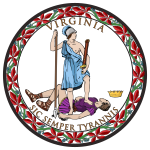A special election was held in Virginia's 5th congressional district on January 21, 1826 to fill a vacancy caused by the resignation of John Randolph (J) on December 26, 1825, after being elected to the Senate. [1]
| Elections in Virginia |
|---|
 |
A special election was held in Virginia's 5th congressional district on January 21, 1826 to fill a vacancy caused by the resignation of John Randolph (J) on December 26, 1825, after being elected to the Senate. [1]
| Candidate | Party | Votes [2] | Percent |
|---|---|---|---|
| George W. Crump | Jacksonian | 418 | 51.9% |
| William B. Giles | None | 388 | 48.1% |
Crump took his seat on February 6, 1826 [1]

The 1826–27 United States House of Representatives elections were held on various dates in various states between July 3, 1826, and August 30, 1827. Each state set its own date for its elections to the House of Representatives before the first session of the 20th United States Congress convened on December 3, 1827. They occurred during John Quincy Adams's presidency. Elections were held for all 213 seats, representing 24 states.
William Baylies was an American lawyer and politician who served four non-consecutive terms as a U.S. Representative from Massachusetts in the early to mid-19th century.

The 1830–31 United States Senate elections were held on various dates in various states. As these U.S. Senate elections were prior to the ratification of the Seventeenth Amendment in 1913, senators were chosen by state legislatures. Senators were elected over a wide range of time throughout 1830 and 1831, and a seat may have been filled months late or remained vacant due to legislative deadlock. In these elections, terms were up for the senators in Class 3.

The 1826–27 United States Senate elections were held on various dates in various states. As these U.S. Senate elections were prior to the ratification of the Seventeenth Amendment in 1913, senators were chosen by state legislatures. Senators were elected over a wide range of time throughout 1826 and 1827, and a seat may have been filled months late or remained vacant due to legislative deadlock. In these elections, terms were up for the senators in Class 1.

Pennsylvania elected its members October 10, 1826.

The 1826 United States Senate election in Pennsylvania was held on December 12, 1826. Isaac D. Barnard was elected by the Pennsylvania General Assembly to the United States Senate.

The 1831 United States Senate special election in Pennsylvania was held on December 13, 1831. George M. Dallas was elected by the Pennsylvania General Assembly to the United States Senate.
Massachusetts elected its members November 6, 1826. It required a majority for election, which was not met on the first vote in 3 districts requiring additional elections held March 5 and May 14, 1827.

On January 12, 1826, Patrick Farrelly (J) of Pennsylvania's 18th district died in office. A special election was held to fill the resulting vacancy

On May 1, 1826, Alexander Thomson (J) of Pennsylvania's 13th district resigned. A special election was held to fill the resulting vacancy on October 10, 1826, the same day as the general elections to the 20th Congress.

At some point in 1826, Joseph Hemphill (J) of Pennsylvania's 2nd district resigned from Congress. A special election was held to fill the resulting vacancy.

On August 14, 1826, Henry Wilson (J) of Pennsylvania's 7th district died. A special election was held to fill the resulting vacancy on October 10, 1826.

In the 1826 elections in Pennsylvania, a tie vote occurred in the 2nd district. As a result, no candidate won in that district and a special election was held on October 9, 1827.

A special election was held in Kentucky's 5th congressional district on November 6, 1826, to fill a vacancy caused by the death of James Johnson (Jacksonian) on August 14, 1826.

A special election was held in Kentucky's 12th congressional district on November 20, 1826, to fill a vacancy caused by the death of Robert P. Henry (J) on August 25, 1826

A special election was held in Maryland's 2nd congressional district on February 1, 1826 to fill a vacancy caused by the resignation of Joseph Kent (A), who had been elected Governor of Maryland.

A special election was held in Mississippi's at-large congressional district on July 11, 1826, to fill a vacancy caused by the death of Christopher Rankin (J) on March 14, 1826

A special election was held in North Carolina's 8th congressional district on November 3, 1826 to fill a vacancy caused by the resignation of Willie P. Mangum (J) on March 18, 1826

A special election was held in Ohio's 10th congressional district on October 10, 1826, the same day as the general elections for the 20th Congress, to fill a vacancy caused by the resignation of David Jennings (A) on May 25, 1826.